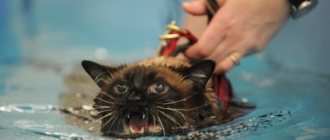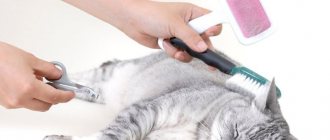Most people, without thinking, will answer the question: “What are cats most afraid of?” Of course, water! Can they answer why cats are afraid of water? Genetics, evolution, personal dislike, phobia? What is the reason for the seemingly irrational fear inherent in these brave creatures?
Zoologists at one time paid close attention to this issue. Probably just out of curiosity, but it was worth it: it turned out that the mustachioed hunters are not afraid of water at all, and do not want to get wet for completely rational reasons.
Risk of hypothermia
Between the top layer of fur and the cat’s skin there is a “layer” of air - the so-called air cushion. This is a protective layer that is heated by the warmth of the cat's body and prevents the pet from freezing. When wet, wool loses its insulating properties. But why are cats afraid of water and dogs are not? To understand, you need to remember the lifestyle of these two animals.
A dog is a pack animal; if it gets cold, it will cuddle up to its fellow tribesman and warm up. The dog hunts, chasing prey - it ran and dried up. The dog tracks game, covering long distances - it has walked and dried off. In addition, they also know how to shake themselves off - droplets of water literally slide off the fur covered with sebum. Now it’s obvious why cats don’t like to swim: there’s no one to snuggle up to, they wait for prey almost without moving, they rarely leave the territory (almost never, to be precise), and they don’t know how to shake themselves off. She lay there and froze while the dog frolicked and dried out. Of course, a pet is unlikely to become hypothermic if it dries out in an apartment, but at the genetic level it “remembers” that wet fur will not protect against the cold.
Why cats can't stand water procedures
How to wash a rat at home, accustom it to water
It would seem that for pets, taking water procedures is a common occurrence; for most cats, bathing is still stressful. This is due to genetics, self-defense, again rooted in the distant past.
Maine Coon loves to swim
The instinct of self-preservation forces the cat not to put its own life in danger and not to go into the water unnecessarily, protecting it from a number of dangers:
- Hypothermia. Getting the fur wet can lead to hypothermia. The fact is that in cats there is an air gap between the skin and the pile. It plays the role of a thermostat and prevents the body from becoming overcooled. When the fur gets wet, the layer does not cope with the task, and the animal may simply freeze.
- Overheating. In hot conditions, this same layer saves you from overheating and maintains normal body temperature.
- Smell. Wet wool has a strong odor that attracts predators and repels prey. Cats go hunting, silently sneaking up on prey and attacking from ambush, and the smell of wet fur gives away its location. The opposite situation, when the cat becomes a victim of predators, forces it to avoid getting wet even in the rain.
- Infections. More dirt and microbes that cause various diseases stick to wet wool. When licked, they inevitably enter the body and lead to weakened immunity.
Can cats swim?
Of course yes. Moreover, felines are excellent swimmers by nature, capable of covering considerable distances, disdainfully stretching out their faces above the water and opening their sparkling eyes in horror (apparently, they are going through the consequences of getting wet in their minds). It is interesting that cats can swim almost from birth - even one-month-old kittens actively work with their paws, scooping up water like a dog.
But why would cats, who hate water, need this skill? It's not hard to guess: cats can swim, like most warm-blooded animals, literally just in case. What if there is a flood? Or will the pursuing enemy drive you straight to the river?
Bathing is stressful
In cats, like most species of mammals, the ability to swim was developed during evolution, even before the process of domestication. In nature, it is survival of the fittest, so from the age of a kitten, animals can float on the water without any problems. In the event of an attack by predators or disasters (floods, fires), saving their own lives, they rush into the water and are able to stay there for a long time. Some individuals are driven into the water by hunger. This happens when there is not enough food on land.
If necessary, the cat can easily overcome water obstacles
Cats swim “like a dog”: scooping up water under themselves with their front paws. It turns out that this is simply wonderful for the cat family, but if you throw your pet into the water to test swimming skills, you can instill in the animal a fear of water procedures for a long time. It is necessary to accustom it gradually and better from an early age, then when bathing the pet will not violently resist.
Much depends on the breed and character of the cat. While some representatives are afraid of even the sounds of flowing water, others bathe with pleasure. Unfortunately they are a minority.
Note! It is more difficult to train an adult cat to bathe than a kitten.
Waterfowl
Strange but true: many wild cats have no fear of hypothermia, overheating or germs. They are not even afraid of the smell, which makes the cat more noticeable to prey and potential enemies. Wild cats that love to swim happily frolic in the water, dive and catch splashes, absolutely not thinking about the consequences of getting their fur wet: tigers, servals, jaguarundi, Sumatran cats.
The lifestyle of the speckled cat is remarkable. Viverrina would probably be very surprised to learn that some people doubt whether cats can swim. This savage does not miss a single chance to splash around, diving deeply and swimming several meters underwater. In addition, she hunts fish, preferring river inhabitants to land-based prey.
Domestic swimmers
Domestic cats that are not afraid of water are not that uncommon. Many pets enthusiastically play with the stream running from the tap, catch droplets of rain, and stir up the water poured into the pan with their paws. Some even cool down on hot days by putting their heads under the stream flowing from the tap. Special unique ones jump into the bathtub when the owner is taking a shower: either for company, or out of curiosity, but on their own, voluntarily!
Very roughly, we can name the breeds of smart cats that love water: Bengal, Turkish Van, Sphynx, Rex, Kuril Bobtail, Savannah. However, these are only general trends, since all cats have an individual character.
The attitude towards water is often formed during the first “meeting” with the mysterious element
And here lies another reason why cats don’t like water. A freedom-loving, proud, independent and even sometimes arrogant pet, she does not tolerate violence, rough treatment and coercion. And owners often make a difficult mistake to correct already during the first bath, by forcefully holding the cat in the bath, scolding it for bad behavior and not giving it the opportunity to “get acquainted” with the water in a calm environment. Fear-stress-fear for life.
A wet fur coat is taboo
The distant voice of ancestors whispers clues where animals have no experience. One of these instincts explains why cats are afraid of water - they simply sense the troubles emanating from it.
Even if Murka has never swam, genetic memory dictates to retreat before the blue element:
- The need to lick yourself after bathing will take a lot of time and distract you from observing your surroundings, which is life-threatening. And if you have to get wet in a musty swamp, washing your face will also be disgusting.
- Sunstroke due to wet fur is a good reason why cats don't like water. Thanks to the air cushion at the roots, the thick, dry wool perfectly protects against temperature changes. When wet, a fur coat loses this property. In nature, dogs have much less hair, and their thermoregulation is worse. But they can breathe with their tongue hanging out to cool themselves. Cats can’t do that, and therefore they quickly overheat.
- The risk of hypothermia due to a wet fur coat also does not add to the desire to swim. The dog cuddles up to its fellow tribesman or simply runs around to dry out. A cat's thicker coat will not dry out from running around, and he will not make so much noise. Without sentinels and the protection of fellow tribesmen, you have to behave secretly. This means that the wool will take a long time to dry, which is dangerous for health in the cold season.
- The smell of wet wool intensifies many times over. As the moisture evaporates, it spreads the characteristic amber around. Not wanting to give yourself away is a very powerful instinct that explains why cats don't like water. The strong smell will certainly attract predators and betray it to prey.
- Bacteria, fungi and other microflora multiply quickly in a warm, humid environment. In cool weather, thick fur will remain damp at the roots for several days, which can lead to infection.
How to teach a cat to love water?
Since Nature herself took it upon herself to teach a cat to swim, the owner only needs to show the pet that water procedures are not only not dangerous, but also fun.
First “meeting”: a shallow bowl, five centimeters of water and floating objects (pieces of polystyrene foam, chocolate egg containers, etc.). We place the bowl on the floor and attract the pet’s attention by throwing toys into the water. The main thing is to do it carefully, without splashing. Sooner or later, a curious cat will not be able to resist and will try to catch the “prey”.
A representative of a breed of smart cats who love water can immediately be subjected to a more difficult test: a shallow wide basin, ten centimeters of water and mechanical floating toys. We proceed as described above.
When the cat gets bored of playing with splashes in the basin, it’s time to go to the bathroom: pour some warm water and throw mechanical toys in there
We place a wide, heavy board across the bathtub (so that it doesn’t rattle and “drive away” when the pet jumps). Some breeders put live fish in the bath, which is even more attractive. We show the cat the “battlefield” and enjoy the spectacle. Having jumped from the board into the bath for the first time, your pet will probably jump out of there with lightning speed. But since no one and nothing is holding her back or forcing her, she will return to the game, because she can always leave.
Why are cats afraid of water?
Many people are concerned about the question: why do dogs rush to the river at the first opportunity, while cats diligently avoid contact with water? There are several reasons for this phenomenon:
- Loss of protection. Domestic cats are much smaller than other felines. This makes it more difficult for them to regulate their body temperature. Only thick fur saves pets from hypothermia, but if it gets wet, the animal can die. Dogs live in packs and can help each other stay warm. But cats, due to their solitary existence, do not have this opportunity. In hot weather, a wet cat lacks natural insulation to prevent overheating. Therefore, animals do not want to risk their health unless absolutely necessary.
- The smell of wet wool. Dogs catch up with their prey, and cats sit in ambush. The pungent aroma of raw fur will easily give away a cat, so instincts tell him that it is better to beware of water so as not to remain hungry. In addition, the animal itself does not like this smell, because of this it becomes irritable.
- Deterioration of skin condition. After washing, the animal's skin becomes dry and susceptible to infection. The cat remembers on an emotional level under what circumstances it feels worse and tries to avoid bathing in the future.
- Risk of enemy attack. The same telltale smell of wet fur can provoke an attack by a large predator. The animal is afraid to disturb a pack of dogs, but a cat walking alone is an easier prey.
- Discomfort. The cat considers bathing a useless procedure. And if the owner washes his pet with hot water and scented soap, the bath day becomes a real test for the animal. It is better not to wet your pet unless absolutely necessary, and if the fur is really dirty, you should use only special shampoos that are sold at the pet store.
Cats are excellent swimmers, but you should not force them to do this activity. If the need to wash the cat does arise, you need to dry the wet animal well with a towel and leave it to dry in a warm room, protected from drafts.
(1 vote, average: 5 out of 5)











